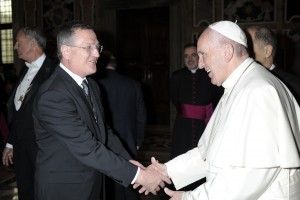Meet Brian Grim & The Halo Project
There’s a growing belief that religion doesn’t contribute to American society, but the numbers don’t support it. Religion in the United States today contributes a combined $1.2 trillion to our economy and society. These expenditures range from the basic economic drivers of any business – staff, overhead, utilities – to billions spent on philanthropic programs, educational institutions and healthcare services. Congregations, faith-based businesses, institutions and faith-based charities strengthen our economy, build communities and families and lift people up in times of need in a way that no other institution or government does.
In the above video, Brian Grim, founder and president of the Religious Freedom & Business Foundation, visually unpacks these findings from his first-of-its-kind nationwide study on the socio-economic value of faith to American society.
It’s not often that an academic report changes the conversation about religion in America, but one just did: The Socio-economic Contributions of Religion to American Society: An Empirical Analysis.
Judging by media pick-up, it might have that potential. Media across the nation and around the globe reported on the results — from Fox Business and BBC to the Washington Post and U.S. News & World Report — and some of that went viral. For instance, the story in the world’s 5th most read news site, the UK’s Guardian, was shared online more than 18,450 times. By way of comparison, the Guardian’s headline story November 9, 2016, announcing that Donald Trump was elected as US President was shared 17,101 times.
And the impact continues to grow. Grim has just been added as an opening day speaker on April 26 at this year’s Q conference in Nashville. Together with his colleague, Prof. Byron Johnson of Baylor, Grim will unpack the implications of this study for some of the nations brightest and best Millennial Christian leaders.
 TEDx: Grim is no stranger to paradigm-shifting research.
TEDx: Grim is no stranger to paradigm-shifting research.
His April 2013 TEDx Talk at the Vatican clearly showed that religious freedom worldwide and in the United States is as equally under threat from social hostilities toward religion as it is from government restrictions on religion.
Grim led the Pew Research study on global restrictions on religion from 2006 until he left to become president of the Religious Freedom & Business Foundation on Feb. 1, 2014.
Grim’s newest research, described below, demonstrates that a core value of religious freedom to society is that it sets people of faith free to do good
The Halo Effect: The Overlooked Story of How Religion Adds At Least $1.2 Trillion to the US Annually By Brian Grim & Byron Johnson
The Halo Effect is the overlooked story of how religion contributes $1.2 trillion to the American economy every year. With compelling stories that illustrate empirical facts, Brian Grim & Byron Johnson show how religion contributes to America’s socio-economic success.
The exciting climactic chapter of The Halo Effect will highlight The Seattle Story: A Case Study in Freedom, Faith & Innovation. While the big innovators from Seattle are well known – Microsoft, Amazon, Starbucks and Boeing – there are hundreds and thousands of others motivated by faith to be generous, and from generosity comes innovation that transforms people, business and society. For example, Pete Shimer the CFO of Deloitte, the world’s largest consulting firm, has held a steadfast commitment to giving back to the community through his four pillars of education, youth, athletics, and faith. Whether he’s serving as CFO, managing partner, board member, mentor, or coach, Pete is passionate about talent development and enjoys helping others realize their full potential. He points to his favorite scripture as the source of his motivation to be generous and a good steward of his time, talent and treasure: “To whom much is given, much will be required” (Luke 12:48). He says, “if we’re not open and available to where God wants us to go, we’re sub-optimizing the talents he’s given us.”
 Brian Grim (Ph.D. Penn State) is the leading academic expert on the quantitative study of religious freedom and global religion, and the founding president of the Religious Freedom & Business Foundation.
Brian Grim (Ph.D. Penn State) is the leading academic expert on the quantitative study of religious freedom and global religion, and the founding president of the Religious Freedom & Business Foundation.
But, more interestingly, Grim is the personification of the film character played by Tom Hanks, “Forrest Gump,” who was everywhere at just the right time. Deng Xiaoping, the Paramount leader of the People’s Republic of China, approved Grim’s proposal to build a faith-based graduate school in the largest Muslim region of China on 8/8/88, a significant date to the Chinese.
Then in November 1989, Grim walked through the Berlin Wall the day it fell. He was there as the Soviet Union dissolved – right in his office building – in what was then the Kazakh Soviet Socialist Republic, and at the request of new (and current) President Nazarbaev, helped turn the Communist Party Training School in the country’s first free market management institute.
Later, during the terrorist attacks of 9/11, Grim was an academic coordinator at the military academy of the United Arab Emirates. And in 2008, the Saudi Arabian Ministry of Hajj considered him the definitive source on the number of Muslims in the world.
After being neighbors with Barak Obama on Capitol Hill (before he became president), the U.S Senate used his research on religious freedom and the economy to pass unanimously a bi-partisan amendment to its policy on international trade. More recently, he had meetings at the Vatican the day Pope Benedict resigned in 2013 and was soon pictured with Pope Francis, not to mention other world leaders as diverse as former British Prime Minister Tony Blair, current Canadian Prime Minister Justin Trudeau and outgoing UN Secretary-General Ban Ki-moon. These Forrest Gump experiences make Grim a participant in our world’s key political, social, religious and economic dynamics.
